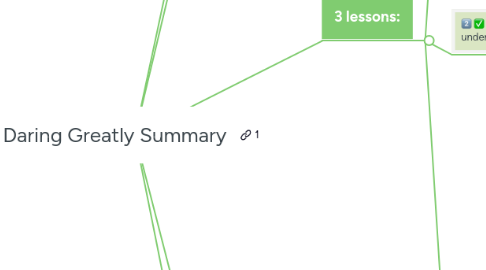
1. 1-Sentence-Summary:
1.1. Daring Greatly is a book about having the courage to be vulnerable in a world where everyone wants to appear strong, confident and like they know what they’re doing.
2. Favorite quote from the author:
2.1. "Courage starts with showing up and letting ourselves be seen." - Brené Brown
3. 3 lessons:
3.1. If you can be vulnerable, it means you’re strong.
3.1.1. Brené makes two core points about vulnerability.
3.1.1.1. Vulnerability isn’t good or bad. It’s not a black and white subject. It’s just a part of life and if you experience it, it means you’re able to feel things.
3.1.1.2. Allowing yourself to actually be vulnerable is a sign of strength and courage.
3.1.1.2.1. It’s a lot easier to avoid the things that might make you vulnerable, rather than lean into them. But that also means we’re missing out on a lot of good things.
3.1.2. For example, if you’ve ever loved someone you know that being in love makes you very vulnerable.
3.1.2.1. You allow someone into your heart and give them incredible power, which includes the power to hurt you.
3.1.2.2. But only if you accept this state of vulnerability do you have a shot at all the love, joy and kindness you might experience from that relationship.
3.1.2.3. This means vulnerability isn’t just the source of pain and grief, but also the root of many positive emotions.
3.1.3. You could hide from the things that make you vulnerable. But you know that’s a cop out.
3.1.4. Leaning into vulnerability is something only the strong, the truly courageous can do.
3.2. Build a resilience to shame by understanding it and saying it out loud.
3.2.1. What’s worse than completely bombing a speaking gig?
3.2.1.1. Being ashamed about bombing a speaking gig and never doing one again.
3.2.2. There’s a quote that goes “Failure is temporary, giving up is what makes it permanent.” Shame is what makes you give up.
3.2.3. There’s a certain level of ridicule to be found in every single shame you express. Pinpointing what actually makes you feel ashamed and saying it out loud takes a lot of power from shame.
3.2.4. Nobody wants to talk about shame. It’s uncomfortable. But the less you do, the more power it has.
3.2.5. Instead, pull at it. Drag it out. Throw it into the light. And address it directly. You’ll see things aren’t as worrisome as they seem and that you can live past failure.
3.3. Be a role model for your (future) kids, it’s the only way they learn.
3.3.1. Your children can only inherit qualities you possess yourself.
3.3.1.1. If you’re sloppy, your children will be sloppy.
3.3.1.2. If you’re organized, your children will be organized.
3.3.1.3. And if you’re constantly shame-ridden, you’ll traumatize your kids by making them feel the same.
3.3.2. If you’ve been bullied, threatened or otherwise traumatized as a kid, you know that most childhood trauma comes from shame. Shame about an event, behavior, or even just about how others have treated us.
3.3.3. Make your home and family a shame-free zone. It’s the only way your kids will grow up feeling worthy, loved and able to truly be themselves.
3.3.4. Instead of talking about values like honesty, courage and ambition, live them. Be honest. Be courageous. Be ambitious. The best thing you can do for your kids, born or not, is to be a role model. It’s all the parenting they need.
